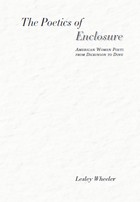2 books about Enclosure

Poetics Of Enclosure
American Women Poets From Dickinson To Dove
Leslie Wheeler
University of Tennessee Press, 2002
In this illuminating critical study, Lesley Wheeler argues for a women’s tradition in American poetry lyric poetry characterized by figures of enclosure. She examines how six dissimilar yet interconnected poets employ this idiom: Emily Dickinson, Marianne Moore, H.D., Gwendolyn Brooks, Elizabeth Bishop, and Rita Dove.
As Wheeler notes, the terms “closed” and “open” have long posed problems for poets and scholars. Addressing such controversies, the author offers three meanings for enclosure: formal confinement, reserve or privacy in both style and content, and a central dependency on imagery of narrow spaces. She finds that Brooks does not exercise “privacy” in the same manner as Dickinson or H.D. and that Moore’s conception of poetic form contrasts sharply with those of Bishop and Dove. Nevertheless, Wheeler asserts, these authors demonstrate a common approach to the lyric that constitutes a central and overlooked mode of American poetry.
In charting the history of an evolving and flexible poetic strategy, The Poetics of Enclosure also argues for the continuing relevance of lyric as a category. While the poets treated here all mount challenges to lyric definition, they also work in crucial relation to its traditions. All conceive of the lyric in terms of rhythmic and/or visual patterns; all allude to the metaphor of voice; and, in particular, all emphasize the boundaries between private and public that the lyric highlights. Where figures of enclosure appear, Wheeler argues, these poets not only illuminate their poetic practice but also, after Dickinson, acknowledge in shorthand their female peers and predecessors.
The Author: Lesley Wheeler is associate professor of English at Washington and Lee University. She has published essays and reviews in the African American Review, Callaloo, Critical Matrix, and other journals. Her poetry has appeared in such publications as American Writing, Northeast Journal, and American Standard.
As Wheeler notes, the terms “closed” and “open” have long posed problems for poets and scholars. Addressing such controversies, the author offers three meanings for enclosure: formal confinement, reserve or privacy in both style and content, and a central dependency on imagery of narrow spaces. She finds that Brooks does not exercise “privacy” in the same manner as Dickinson or H.D. and that Moore’s conception of poetic form contrasts sharply with those of Bishop and Dove. Nevertheless, Wheeler asserts, these authors demonstrate a common approach to the lyric that constitutes a central and overlooked mode of American poetry.
In charting the history of an evolving and flexible poetic strategy, The Poetics of Enclosure also argues for the continuing relevance of lyric as a category. While the poets treated here all mount challenges to lyric definition, they also work in crucial relation to its traditions. All conceive of the lyric in terms of rhythmic and/or visual patterns; all allude to the metaphor of voice; and, in particular, all emphasize the boundaries between private and public that the lyric highlights. Where figures of enclosure appear, Wheeler argues, these poets not only illuminate their poetic practice but also, after Dickinson, acknowledge in shorthand their female peers and predecessors.
The Author: Lesley Wheeler is associate professor of English at Washington and Lee University. She has published essays and reviews in the African American Review, Callaloo, Critical Matrix, and other journals. Her poetry has appeared in such publications as American Writing, Northeast Journal, and American Standard.
[more]

Walls
Enclosure and Ethics in the Modern Landscape
Thomas Oles
University of Chicago Press, 2014
Stone walls, concrete walls, chain-link walls, border walls: we live in a world of walls. Walls mark sacred space and embody earthly power. They maintain peace and cause war. They enforce separation and create unity. They express identity and build community. Yard to nation, city to self, walls define and dissect our lives. And, for Thomas Oles, it is time to broaden our ideas of what they can—and must—do.
In Walls, Oles shows how our minds and our politics are shaped by–and shape–our divisions in the landscape. He traces the rich array of practices and meanings connected to the making and marking of boundaries across history and prehistory, and he describes how these practices have declined in recent centuries. The consequence, he argues, is all around us in the contemporary landscape, riven by walls shoddy in material and mean in spirit. Yet even today, Oles demonstrates, every wall remains potentially an opening, a stage, that critical place in the landscape where people present themselves and define their obligations to one another. In an evocative epilogue, Oles brings to life a society of productive, intentional, and ethical enclosure—one that will leave readers more hopeful about the divided landscapes of the future.
In Walls, Oles shows how our minds and our politics are shaped by–and shape–our divisions in the landscape. He traces the rich array of practices and meanings connected to the making and marking of boundaries across history and prehistory, and he describes how these practices have declined in recent centuries. The consequence, he argues, is all around us in the contemporary landscape, riven by walls shoddy in material and mean in spirit. Yet even today, Oles demonstrates, every wall remains potentially an opening, a stage, that critical place in the landscape where people present themselves and define their obligations to one another. In an evocative epilogue, Oles brings to life a society of productive, intentional, and ethical enclosure—one that will leave readers more hopeful about the divided landscapes of the future.
[more]
READERS
Browse our collection.
PUBLISHERS
See BiblioVault's publisher services.
STUDENT SERVICES
Files for college accessibility offices.
UChicago Accessibility Resources
home | accessibility | search | about | contact us
BiblioVault ® 2001 - 2024
The University of Chicago Press









